GDPR, som är en förkortning av General Data Protection Regulation, är en EU-lag som skyddar användarnas integritet när de använder webbplatser.
Vi har fått dussintals e-postmeddelanden från användare som ber oss att förklara GDPR på vanlig engelska och dela med oss av tips om hur du gör din WordPress webbplats GDPR-kompatibel.
I den här artikeln kommer vi att förklara allt du behöver veta om GDPR och WordPress (utan den komplexa juridiska biten).
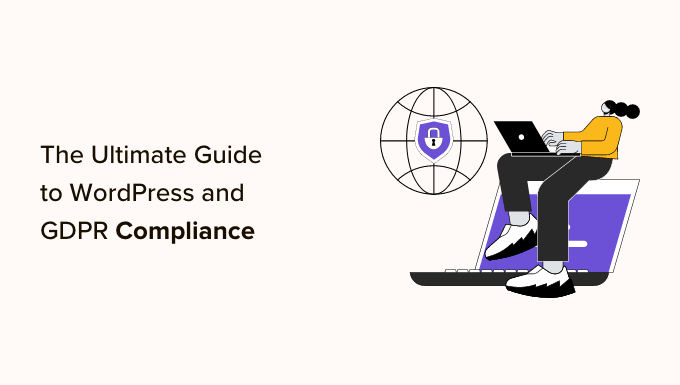
Ansvarsfriskrivning
Vi är ej jurister och inget på denna website ska betraktas som juridisk rådgivning.
För att hjälpa dig att enkelt navigera genom vår ultimata guide till WordPress och GDPR-överensstämmelse har vi skapat en innehållsförteckning under:
- What Is the GDPR?
- Does the GDPR Apply to My WordPress Website?
- What Is Required of Website Owners Under the GDPR?
- Is WordPress GDPR Compliant?
- Additional Areas on Your Website to Check for GDPR Compliance
- Best WordPress Plugins for GDPR Compliance
- Final Thoughts
- Expert Guides on Making Your WordPress Site GDPR-Compliant
- Additional Resources
Vad är GDPR?
Den allmänna dataskyddsförordningen (GDPR) är en lag från Europeiska unionen (EU) som trädde i kraft den 25 maj 2018. Målet med GDPR är att ge EU-medborgarna control över sina personuppgifter och att förändra hur organisationer över hela världen arbetar med integritet.
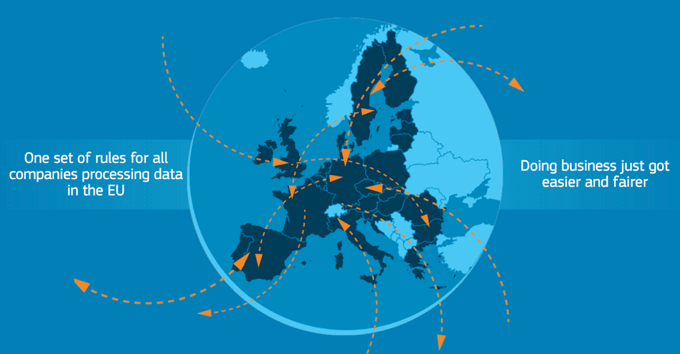
Under årens lopp har du troligen fått dussintals email från företag som Google om GDPR, deras nya integritetspolicyer och en massa andra juridiska saker. Det beror på att EU har infört stora påföljder för personer som inte följer bestämmelserna.
Företag som ej uppfyller de obligatoriska kraven i GDPR kan drabbas av stora böter på upp till 4% av företagets globala årsomsättning eller 20 miljoner euro (det högsta beloppet gäller). Detta är tillräckligt för att orsaka utbredd panik bland företag runt om i världen.
Vad är CCPA?
Delstaten Kalifornien införde liknande lagstiftning om integritet den 1 januari 2020, även om de potentiella böterna är mycket lägre.
California Consumer Integritetsskydd (CCPA) är utformat för att skydda Kaliforniens invånares personliga information. Den ger dem rätt att veta vilka personuppgifter som samlas in om dem, requesta att de ska bli borttagna och tacka nej till försäljning av deras uppgifter.
I den här artikeln fokuserar vi på GDPR, men många av de steg vi tar upp i artikeln hjälper dig också att uppfylla kraven i CCPA.
Detta leder oss till den stora frågan som you kanske funderar på:
Tillämpas GDPR på min website i WordPress?
Svaret på frågan är JA. Det gäller alla företag, stora som små, i hela världen (eller ej bara i Europeiska unionen).
Om din WordPress website har besökare från länder i Europeiska unionen, gäller denna lag för you.
Men få inte panik. Det är inte världens undergång.
Även om GDPR kan leda till dessa höga bötesnivåer kommer det att börja med en varning, sedan en reprimand och sedan ett avbrytande av databehandlingen.
Och det är bara om you fortsätter att bryta mot lagen som de stora böterna kommer att slå till.
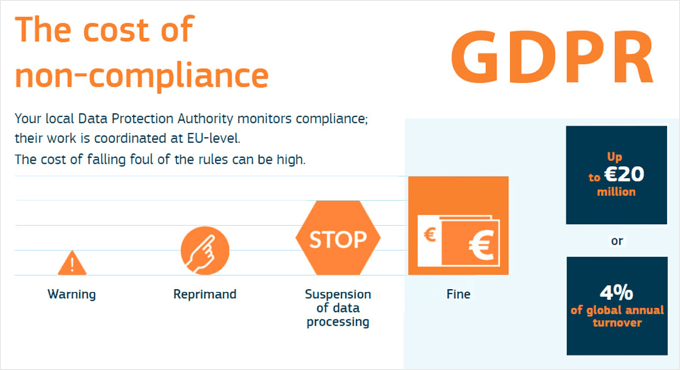
EU är inte någon ond regering som är ute efter you. Dess mål är att skydda oskyldiga konsumenter från vårdslös datahantering som kan leda till att deras integritet kränks.
Enligt vår mening är det maximala bötesbeloppet till stor del avsett att få uppmärksamhet från stora företag som Facebook och Google så att denna förordning INTE ignoreras. Dessutom uppmuntrar detta företagen att faktiskt lägga större vikt vid att skydda människors rättigheter.
När du väl förstår vad som är obligatoriskt enligt GDPR och lagens anda, kommer du att inse att inget av detta är för galet.
Vi kommer också att dela med oss av tools och tips för att göra din WordPress site GDPR-kompatibel.
Vad är obligatoriskt för ägare av websites enligt GDPR?
Målet med GDPR är att skydda användarnas personligt identifierande information (PII) och att ställa högre krav på företag när det gäller hur de samlar in, lagrar och använder dessa uppgifter.
Dessa personuppgifter inkluderar dina användares namn, email addresser, fysiska adresser, IP-adresser, hälsoinformation, inkomst och mycket mer.
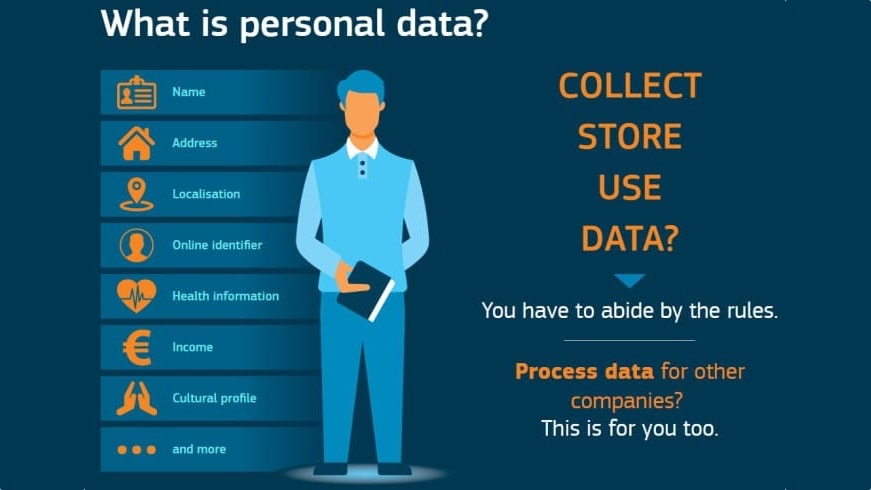
GDPR-förordningen är på 200 pages, men här är de viktigaste pelarna som du behöver känna till:
You måste inhämta uttryckligt samtycke för att samla in personlig information
Om du samlar in personuppgifter från en person som är bosatt i EU måste du få ett uttryckligt, specifikt och otvetydigt samtycke eller en uttrycklig, specifik och otvetydig behörighet.
Med andra ord kan du inte bara skicka oönskade email till någon som gav dig sitt visitkort eller fyllde i kontaktformuläret på din website. Det här är skräppost. Istället måste du allow them to opt-in to your marketing newsletter.
För att det ska anses vara ett uttryckligt samtycke måste you kräva ett positivt tack ja. Checkboxen får ej vara ikryssad som standard, måste innehålla clear wording (inget juridiskt språk) och måste vara separerad från andra Terms and Conditions.
Dina användare har rätt till sina personuppgifter
You måste informera enskilda om var, varför och hur deras uppgifter behandlas och lagras.
En enskild har rätt att downloada sina personuppgifter och rätt att bli bortglömd.
Det innebär att de har rätt att kräva att du tar bort deras personuppgifter. När en användare klickar på en länk för att avsluta prenumerationen eller ber dig att ta bort dennes profil, måste du faktiskt göra det.
You måste tillhandahålla snabba aviseringar om dataintrång
Auktorisationer måste rapportera vissa typer av dataintrång till relevanta myndigheter inom 72 timmar, såvida inte intrånget anses vara ofarligt och inte utgör någon risk för enskilda uppgifter.
Men om ett intrång innebär en hög risk måste företaget också informera enskilda som påverkas direkt.
Detta kommer förhoppningsvis att förhindra covers som Yahoo som inte avslöjades förrän efter förvärvet.
You kan behöva utse ett Personuppgiftsombud
Om du är ett offentligt företag eller behandlar stora mängder personuppgifter måste du utse ett dataskyddsombud.
Detta är inte obligatoriskt för småföretag. Rådgör med en advokat om du är osäker.
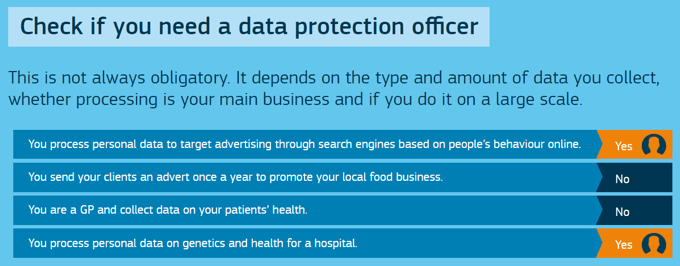
Sammanfattning av vad som är obligatoriskt i klartext
I klartext innebär GDPR att företag inte får skräpposta människor genom att skicka email till dem som de inte har bett om. Företag kan inte heller sälja uppgifter om människor utan deras uttryckliga samtycke.
Företag måste radera användares konton och avsluta prenumerationen på email lists när de blir tillfrågade. Företag måste också rapportera dataintrång och överlag bli bättre på dataskydd.
Låter ganska bra, kl. i teorin i alla fall.
Men du undrar säkert vad du behöver göra för att se till att din WordPress webbplats är GDPR-kompatibel.
Det beror verkligen på din specifika website (mer om detta senare).
Låt oss börja med att besvara den största frågan som vi har fått från användare:
Är WordPress GDPR-kompatibelt?
Ja, programvaran WordPress core är GDPR-kompatibel sedan WordPress 4.9.6, som släpptes den 17 maj 2018. Flera GDPR-förbättringar har lagts till för att uppnå detta.
Det är viktigt att notera att när vi talar om WordPress, talar vi om WordPress.org som drivs på en egen server. Detta skiljer sig från WordPress.com, och du kan lära dig mer om skillnaden i vår guide om WordPress. com vs. WordPress.org.
Med detta sagt, på grund av den dynamiska karaktären hos websites, kan ingen enskild plattform, plugin eller lösning erbjuda 100% GDPR-efterlevnad. Processen för efterlevnad av GDPR kommer att variera beroende på vilken typ av website du har, vilka data du lagrar och hur du behandlar data på din site.
Ok, så du kanske tänker, vad betyder detta på vanlig engelska?
Som standard levereras WordPress med följande GDPR-förbättringsverktyg:
Comments Checkbox för samtycke
Före maj 2018 lagrade WordPress som standard kommentatorns namn, email och webbplats som en cookie i användarens webbläsare. Detta gjorde det enklare för användare att lämna kommentarer på sina favoritbloggar eftersom dessa fält var förifyllda.
På grund av GDPR:s krav på samtycke har WordPress lagt till en checkbox för samtycke i formuläret för kommentarer.

Användaren kan lämna en comment utan att kontrollera denna box. De måste dock manuellt enter sitt namn, email och website varje gång de gör det.
Tips: Se till att du är utloggad när du testar för att se om checkboxen finns där.
Om checkboxen fortfarande inte visas, åsidosätter ditt theme troligen standardformuläret för WordPress comment. Här är en Step-by-Step guide om hur du lägger till en GDPR checkbox för integritet för kommentarer i ditt WordPress theme.
Funktioner för att exportera och radera personuppgifter
WordPress erbjuder webbplatsägare de tools de behöver för att uppfylla GDPR:s krav på datahantering och uppfylla användarnas request om att exportera personuppgifter samt remove av användarnas personuppgifter.
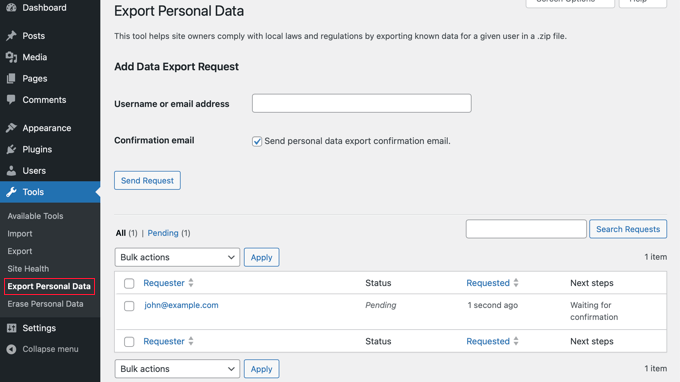
Funktionerna för datahantering hittar du under Tools-menyn i WordPress admin. Härifrån kan du gå till Exportera personuppgifter eller Radera personuppgifter.
Generator för Integritetspolicy
WordPress levereras med en built-in generator för integritetspolicy. Den har en färdig template för integritetspolicyn och ger dig vägledning om vad du kan lägga till. Detta hjälper dig att vara mer transparent mot användarna i termer av vilka data du lagrar och hur du hanterar deras data.
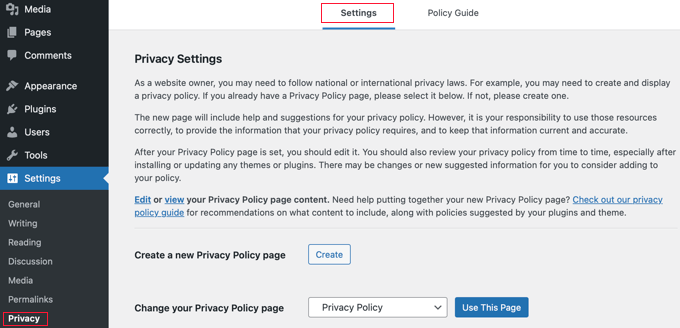
Du kan läsa mer i vår guide om hur du skapar en integritetspolicy i WordPress.
Dessa tre funktioner räcker för att göra en standard WordPress blogg GDPR-kompatibel. Men din website kommer sannolikt att ha ytterligare areas som också måste vara i överensstämmelse.
Ytterligare areas på your website att kontrollera för efterlevnad av GDPR
Som ägare av en website kanske du använder olika tillägg till WordPress som lagrar eller behandlar data, och dessa kan påverka din efterlevnad av GDPR. Vanliga exempel inkluderar:
Beroende på vilka tillägg till WordPress du använder på din website måste du agera därefter för att se till att din website uppfyller kraven i GDPR.
Många av de bästa WordPress-tilläggen har lagt till funktioner för att förbättra GDPR. Låt oss ta en titt på några av de vanligaste area som du kommer att behöva adressera.
Google Analytics
Gillar de flesta webbplatsägare, du använder sannolikt Google Analytics för att få statistik över webbplatsen. Det innebär att du kanske samlar in eller trackar personuppgifter som IP-adresser, ID:n för användare, cookies och andra data för beteendeprofilering.
För att uppfylla kraven i GDPR måste du göra något av följande:
- Anonymisera uppgifterna innan lagring och behandling påbörjas.
- Add to ett överlägg som ger notice om cookies och ber användarna om samtycke före tracking.
Båda dessa är ganska svåra att göra om du bara klistrar in Google Analytics-kod manuellt på din webbplats. Men om du använder MonsterInsights, det mest populära Google Analytics-tillägget för WordPress, har du tur.
De har släppt ett EU Compliance addon som hjälper till att automatisera processen ovan.

MonsterInsights har också ett mycket bra blogginlägg som handlar om GDPR och Google Analytics. Detta är ett måste att läsa om du använder Google Analytics på din site.
Contact Formulär
Om du använder ett kontaktformulär i WordPress kan du behöva add to extra transparensåtgärder. Detta gäller särskilt om du lagrar formulärposterna eller använder uppgifterna för marknadsföringsändamål.
Här är några saker du bör tänka på när du gör dina WordPress-formulär GDPR-kompatibla:
- Få uttryckligt samtycke från användarna att lagra deras information.
- Få uttryckligt samtycke från användarna om du har planer på att använda deras uppgifter i marknadsföringssyfte, t.ex. genom att lägga till dem på din email list.
- Inaktivera cookies, användare-agent och IP tracking för formulär.
- Tillmötesgå requests om data delete.
- Om du använder en SaaS-formulärslösning ska du se till att du har ett databehandlingsavtal med dina formulärleverantörer.
Den goda nyheten är att du inte behöver organisera ett databehandlingsavtal om du använder ett WordPress-plugin som WPForms, Gravity Forms eller Ninja Forms.
Dessa plugins lagrar dina formulärposter i din WordPress database, så för att följa GDPR behöver du bara add to en checkbox för samtycke med en clear förklaring.
WPForms, det plugin för kontaktformulär som vi använder på WPBeginner, har flera GDPR-förbättringar som gör det enkelt för dig att lägga till ett fält för GDPR-samtycke, inaktivera användarcookies, inaktivera insamling av användar-IP och inaktivera poster med ett enda click.
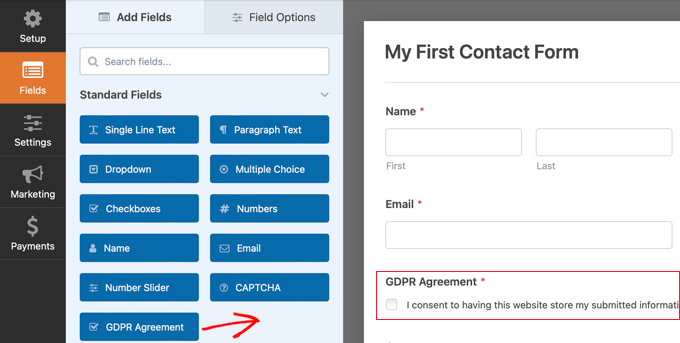
Du kan se vår Step-by-Step guide om hur du skapar GDPR-kompatibla formulär i WordPress.
Formulär för att tacka ja till e-postmarknadsföring
Likes contact forms, if you have any email marketing opt-in forms like popups, floating bars, inline forms, and others, then you need to make sure that you get explicit consent from users before adding them to your list.
Detta kan göras genom att antingen:
- Add to en checkbox som användaren måste klicka på innan han/hon kan tacka ja.
- Kräv helt enkelt dubbel-optin till din email list.
Topplösningar för generering av leads som OptinMonster har lagt till checkboxar för GDPR-samtycke och andra nödvändiga funktioner som hjälper dig att göra dina opt-in-formulär för e-post kompatibla.
Du kan läsa mer om GDPR-strategier för marknadsförare på OptinMonster-bloggen.
Butiker för ecommerce och WooCommerce
Om du använder WooCommerce, det mest populära pluginet för ecommerce för WordPress, måste du se till att din website uppfyller kraven i GDPR.
Lyckligtvis har MonsterInsights team tagit fram en djupgående guide om hur man gör en WooCommerce store GDPR-kompatibel.
Retargeting-annonser
Om din website kör retargeting-pixlar eller retargeting-annonser måste du få användarens samtycke.
Du kan göra detta genom att använda ett plugin som WPConsent. Det blockerar alla spårningsskript tills användarna ger sitt tillstånd, till skillnad från grundläggande cookie-meddelanden som bara visar en varning.
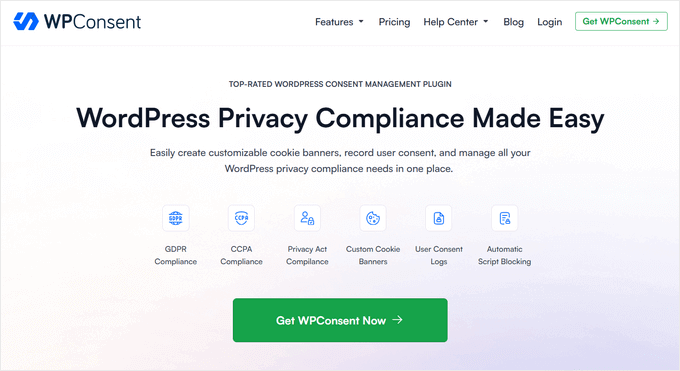
Pluginet hanterar populära tjänster som Google Analytics och Facebook Pixel samtidigt som det sparar detaljerade samtyckesregister, så att du kan köra dina marknadsföringskampanjer i vetskap om att du är helt kompatibel.
Du hittar detaljerade instruktioner i vår guide om hur du lägger till en cookies-popup i WordPress för GDPR/CCPA.
Google Fonts
Google Fonts är ett bra sätt att customize typografin på din WordPress website.
Det har dock visat sig att Google Fonts bryter mot bestämmelserna i GDPR. Det beror på att Google loggar din besökares IP-adress varje gång ett font hämtar.
Som tur är finns det några sätt att hantera detta så att din website är GDPR-kompatibel. Du kan till exempel hämta dina fonts lokalt, ersätta Google Fonts med ett annat alternativ eller inaktivera dem.
You can learn how in our guide on how to make Google Fonts privacy-friendly.
Bästa tillägg till WordPress för efterlevnad av GDPR
Det finns flera tillägg till WordPress som kan hjälpa dig att automatisera vissa delar av efterlevnaden av GDPR.
Inget plugin kan dock erbjuda 100% efterlevnad på grund av webbplatsers dynamiska natur.
Akta dig för alla tillägg till WordPress som påstår sig vara 100% GDPR-kompatibla. De vet troligen inte vad de pratar om, och det är bäst för you att undvika dem helt och hållet.
Under finns vår lista över rekommenderade tillägg för efterlevnad av GDPR:
- WPConsent blockerar automatiskt alla spårningsskript tills besökarna ger sitt tillstånd, för detaljerade register över användarnas samtycke och innehåller lättanpassade integritetsbanners för att se till att din webbplats uppfyller kraven. Det finns också en gratisversion av WPConsent tillgänglig.
- Om du använder Google Analytics rekommenderar vi att du använder MonsterInsights och aktiverar deras EU Compliance addon.
- WPForms är det mest användarvänliga tillägget för kontaktformulär för WordPress och erbjuder GDPR-fält och andra funktioner.
- Cookie Notice är ett populärt gratis plugin för att lägga till ett EU cookie notice, och det integreras väl med topp plugins som MonsterInsights och andra.
- GDPR Cookie Consent låter dig skapa ett alert-fält på din site så att användaren kan bestämma om de vill godkänna eller avvisa cookies och täcker CCPA såväl som GDPR.
- WP Front-end Delete Account är ett gratis plugin som tillåter användare att automatiskt radera sin profil på din site.
- OptinMonster är en avancerad programvara för att generera leads som erbjuder smarta funktioner för att öka konverteringen samtidigt som den är GDPR-kompatibel.
- PushEngage låter dig skicka riktade push messages till besökare efter att de lämnat din site och är helt GDPR-kompatibelt.
- Smash Balloon ger dig ett GDPR-kompatibelt sätt att embedda live feeds och visa post från Facebook, Twitter, Instagram, YouTube, TripAdvisor och mer.
- Novashare erbjuder ett sätt att låta användare dela ditt innehåll på sociala medier utan att samla in deras personuppgifter eller placera cookies.
Du hittar fler alternativ i vårt expertval av de bästa WordPress GDPR tillägg för att förbättra efterlevnaden.
Vi kommer att fortsätta att övervaka ekosystemet för tillägg för att se om något annat WordPress-tillägg sticker ut och erbjuder väsentliga funktioner för efterlevnad av GDPR.
Slutliga tankar
GDPR har varit i kraft sedan maj 2018.
Kanske har du haft din WordPress website ett tag och har arbetat för att uppfylla kraven i GDPR. Eller så kanske du precis har börjat med en new website.
I vilket fall som helst finns det ingen anledning till panik. Fortsätt bara att arbeta för att uppfylla kraven och få det gjort så snart som möjligt.
You kanske är orolig för de stora böterna. Kom ihåg att risken för att få böter är minimalistisk. På EU:s website står det att du först får en varning, sedan en reprimand och att böter är det sista steget om du Misslyckas med att följa lagen och medvetet ignorerar den.
Kom ihåg att EU inte är ute efter att ta dig. De gör detta för att skydda användarnas uppgifter och återställa människors förtroende för onlineföretag.
När världen blir digital behöver vi dessa standarder. Med tanke på de senaste dataintrången i stora företag är det viktigt att dessa standarder anpassas globalt.
Det kommer att vara bra för alla inblandade. Dessa new regler kommer att bidra till att öka konsumenternas förtroende och i sin tur bidra till att utveckla your business.
Vi hoppas att denna tutorial hjälpte dig att lära dig hur du blir GDPR-kompatibel på din WordPress blogg. Du kanske också gillar att se våra expertguider om hur du gör din website GDPR-kompatibel.
Expertguider om hur du gör din site i WordPress GDPR-kompatibel
- Så här addar du en checkbox för att tacka ja till integritet i GDPR-kommentarer i WordPress
- Så här addar du en Cookie popup i WordPress för GDPR/CCPA
- Så här vet du om din website i WordPress använder Cookies
- Så här skapar du GDPR-kompatibla formulär i WordPress
- Så här håller du personligt identifierbar information borta från Google Analytics
- Så här gör du Googles fonts integritetskänsliga
- Så här inaktiverar du Google Fonts på din website i WordPress
- Så här addar du en Integritetspolicy i WordPress
If you liked this article, then please subscribe to our YouTube Channel for WordPress video tutorials. You can also find us on Twitter and Facebook.
Juridisk ansvarsfriskrivning
Vi är ej advokater, och inget på denna website ska betraktas som juridisk rådgivning. På grund av webbplatsers dynamiska natur kan inget enskilt plugin eller plattform erbjuda 100% juridisk efterlevnad.
Om du är osäker är det bäst att konsultera en advokat som är specialist på interneträtt för att avgöra om you följer all tillämplig lagstiftning för dina jurisdiktioner och dina användningsområden.
Ytterligare resurser
- GDPR-hysteri del I och del II av Jacques Mattheij
- Infografik om dataskydd från Europeiska kommissionen
- Principer för GDPR av Europeiska kommissionen
- GDPR och MonsterInsights – allt du behöver veta om efterlevnad av GDPR för Google Analytics
- Utvaldafunktioner för GDPR i WPForms – allt du behöver veta om GDPR för dina formulär i WordPress
- WooCommerce och GDPR – allt du behöver veta om GDPR-överensstämmelse för din store
- OptinMonster och GDPR – allt du behöver veta om efterlevnad av GDPR och formulär för att tacka ja till e-postmarknadsföring
If you liked this article, then please subscribe to our YouTube Channel for WordPress video tutorials. You can also find us on Twitter and Facebook.





Chris
I never paid attention to those tabs under the tools tab in Admin until now. The privacy policy page that WordPress provides seems enough for any website I might run in the future. Is the GDPR only applicable to websites domicile in the EU, or does it apply to websites that have visitors from the EU?
WPBeginner Support
It would affect your site if you have visitors from the EU
Admin
Mrteesurez
Also, I can see maybe that’s why WordPress itself comes with a basic privacy policy generator with some suggested text.
I just discovered it not so long.
But is that basic content sufficient ?? because sometimes I used the basic WP generated policy contents for new blogs.
WPBeginner Support
You would want to edit the content in the privacy policy to suit your needs and if you are concerned then you would want to check with a legal professional.
Admin
Mrteesurez
OK, maybe when the blog grows and gaining more traction, then, I can seek out to legal professional for a standard and official policy.
Thanks.
Mrteesurez
Honestly, most of the bloggers and online marketer who just want to make money online don’t usually take this serious.
I could remember how much fine I heard in the press that Google have paid and some other businesses that use tracking software.
My question is, Is this only applicable for if I have visitors from EU ??
Also, you talk of ‘checkbox’.
In WPbeginner, checkbox is not showing, I manually need to re-enter names and email every time I want to comment. Can you fix this ?? or is there any reason no to do this ??
WPBeginner Support
It is applicable to more than the EU, we give an example with California in the article above.
We do not have the consent checkbox at the moment, our theme style overrides the checkbox. We do not save your information in the browser for the time being.
Admin
Mrteesurez
Ok, I understand but you can try to implement it for easy participation in the community.
It can be autofilled or save it in browser but give disclaimer or include it in your privacy policy.
Jiří Vaněk
I hadn’t paid much attention to this topic before, but practice eventually showed me that it’s indeed much better to have everything in order on the website, especially when it comes to laws. Living in an EU country, GDPR is now a top priority for me. Guides like these are great because there’s always something one might overlook.
WPBeginner Support
Glad you found our guide helpful
Admin
Moinuddin Waheed
Thankfully I am not from any of the European country which means GDPR rule will not apply to my website. But data protection has been a prime topic for every country not that for European countries only. we have similar data protection bill in our country as well. it is infact good to see that there is enhanced awareness in terms of data and content online.
thanks for detailing every bit of GDPR for us
WPBeginner Support
You’re welcome
Admin
Ralph
Good to find such a detailed guide that not only explains what to do, but also how and why it is important.
I see GDPR as a plus for user as he can have some impact on his data, but we have to have more and more annoying popups on websites. Cookies, ads, newsletters, GDPR… In 5 or 10 years we will spend more time closing this than reading websites. I wish governments can come up with new 1 idea, that will replace all of that.
Geethu
Thank you for the detailed explanation. It cleared some of the queries I had especially if GDPR applied to websites outside the EU and what to keep in mind while making them GDPR complaint.
WPBeginner Support
You’re welcome, glad we could clear up some confusion!
Admin
Ram E.
Thanks for listing the two cookie notice plugins (Cookie Notice and GDPR Cookie Consent)! I’ve been meaning to find and install one on my blog. This compliance stuff is one of the reasons why I haven’t opened my blog for user registrations yet, and it’s going to be more complicated if more and more countries require it. Personally, I think this is not a big deal though if an EU country or California is not one of your top 10 locations by sessions.
WPBeginner Support
You’re welcome, glad our recommendations were helpful
Admin
John Fernandez
Thanks for the article! This guide will help me manage my wordpress site better.
WPBeginner Support
Glad our guide was helpful
Admin
Ahmed Omar
Thank you for the detailed post.
I have concern about GDPR , what if the visitor did not accept the terms, would he still be able to browse my site or register
Thank you
WPBeginner Support
Unless you set it up to prevent access, the users should still be able to browse your site. For registration you can have a required checkbox to prevent registrations.
Admin
Mikolaj
Thanks for the article! It’s good to know that WP tracks the development of the situation on an ongoing basis
Charles Anderson
Great post, helpful WordPress and GDPR guide ness. keep posting more articles.
WPBeginner Support
Thank you, glad you liked our article
Admin
Chris H
A kind of good post. All SMEs and large business should be GDPR compliant. GDPR Awareness must be given to the staffs.
WPBeginner Support
Glad you liked our content
Admin
Shashank
Nice Blog. Thank you for the article about GDPR. Much needed for me
Gavin
I am still a little confused with all this. Some say as long as you get consent and use something like a cookie/privacy popup to alert users and get consent etc its fine. But surely once someone has visited your site the cookies have already been placed in their browser so in this case should all cookies etc not be used until the users agrees? If this is the case how do we achieve this?
Konrad
Some cookies are just required to load the page.
Users consent to the use of 3rd party and non-essential cookies.
Trond
Hi,
I would just like to add that the Cookie Notice for GDPR plugin states it’s “100% GDPR compliant”. See “features include” at their plugin page.
You say that “Beware of any WordPress plugin that claims to offer 100% GDPR compliance. They likely don’t know what they’re talking about, and it’s best for you to avoid them completely.”
So, how can Cookie Notice be recommended by you?
WPBeginner Support
Hi Trond,
Cookie Notice is a useful plugin, however the plugin alone cannot make your website 100% GDPR compliant.
Admin
Rick OD
how could a law in the European Union hold any water in the USA and how on earth could they fine you or force you to make changes to your website here in the US if no US law forces GDPA compliance?
Mathukutty P. V.
I have Monsterinsights free version. Can not afford to buy pro now so cant install addon.
I was using Jetpack comment, after reading this post changed to wp default. Thanks.
Mathukutty P. V.
Thanks for the clarification. Mine is a personal blog. Will try to modify privacy policy.
Debbie
Excellent article. Could you clarify something I’d not seen mentioned anywhere else?
According to GDPR Article 83, (this is not a quote, but my own summary) fines, penalties, or other consequences for non-compliance, would be based on your footprint as an organization, the degree to which you collect and process data from Europe, and the severity of the infraction.
You said: “While GDPR has the potential to escalate to those high level of fines, it will start with a warning, then a reprimand, then a suspension of data processing, and if you continue to violate the law, then the large fines will hit.” And then you have an infographic with this info.
That’s a very specific progression. Can you point to an official notification or article somewhere where this is stated? Specifically, that an infraction would start with a warning, etc. And let’s just assume we’re talking about the average or smaller site and not Facebook. Thanks!
Thanks!
Abin
Seems it is the lengthy process to correct all the checks against each clause, do we have any plugin available to do correction across the WordPress blog?
Prithvi Raj
This is impossible to enforce.
Who is going to go around and check if every single site is following this?
What are newbie website owners going to do?
It is hard enough to create a website and get a few people to come and read, and now you also have to deal with rubbish like this?
To put it in plain English, the EU intended that big giants like Google and FB don’t screw with data.
This law is not for the average Joe. There are hundreds of laws ordinary people break everyday by visiting simple websites, and doing simple thing online. Nobody can enforce laws like GDPR on small business owners.
If you’re getting big, you definitely need to comply, it also makes sense, if you’re bigger, you have more resources.
Prithvi
I doubt if this GDPR can be enforced for small businesses, does the EU plan on going after every single small website?
I’m not based in the EU, this regulation does not apply to me, at least not at this level (I’m a small business).
Even if it does apply, I can’t make any changes for every single regulation that comes about in different countries.
I’d like to see how this plays out over the years, it is primarily meant for giants, not for ordinary people.
Jeanne
Thanks for the article! I am glad to know the WP is all over this topic.
Geoff
The Ginger plugin works, it is simple to use and will block 3rd party cookies if the user wishes to not accept cookies but still see the website in question.
Christophe Huget
Hello, I use Iubenda to manage my Privacy Policy, the page is not physically on our website, it’s hosted on Iubenda.com. There’s no option to add a link to an external link.
owolabi Thankgod
I was sent a message by google that I should log into my adsense account and accept their new privacy policy and I have done that
Is this same as GDPR because I am getting increasingly confused after reading this article
Please what am I to do to make my wordpress site GDPR complaint because as for me, i have not done anything whatsoever.
Guust
The article says there are fines for companies, so what if my business is not carried on by a company?
And what about hobby websites and blogs, as in non-business websites?
Either the article is not complete or misleading?
Can you clarify?
Thanks
Nanette Irvine
Thank you for your informative article. I have a question in regard to a blog I write. I have a self hosted WordPress site with a Divi theme. It is not a business, no marketing, no advertising – purely sharing a personal journey. I do offer people the opportunity to receive a notice when the next post is up. Their name and email address is stored in Aweber. Do I have to have Privacy notice etc for GDPR compliance?
Mamun
Very informative article. Really I was confused about the term GDPR. Now it’s clear to me…Thanks buddy
Bill
I disagree with assuming the EU can dictate to a business without a physical location in an EU country. This is a sovereignty issue most US citizens would have issue with like the tea tax which basically started the American colonies fight for independence. The EU cannot globally criminalize an action they do not like and penalize a US citizen, or other citizen outside their umbrella of power, based on such action. To say they can is the height of socialist arrogance.
Nor does the EU have dominion over the internet. If they do not like the way the rest of the world does business they are free to lock their coddled citizens in a make believe world much like the Chinese do.
JC
True indeed but then there is DMCA which is an American law designed to protect copyright that people also follow regardless of soveriegnty. And Americans seem not to fight paying tax abroad even when their physical location and employment does not fall under American jurisdiction.
Geoff
Of course the EU can criminalise certain actions globally.
Currently – The sale of illicit goods to the EU can be made illegal and any EU police force make arrests for certain actions carried out by people entering the EU.
The point is, this is a step towards protecting the data of anyone residing within the EU (even non-EU nationals). If a US based organisation releases data that is personal to me for their own gain or because they did not protect it properly – they should be penalised.
Nathan
Yes! I thought I was the only one who’s thinking this way. Is there a legal precedent for something like this? A citizen from the EU visits my site and all of the sudden they have the right to legislate what I can and can’t do? I think everyone is jumping on the GDPR train because it means more work (i.e. more money) for developers. Is anyone else willing to just say that the emperor doesn’t have any clothes?
Tony Tremblay
I don’t think they will go after anyone outside the Euro zone. What they could do howerver is force Google to integrate them in the search engine ranking factors. This way, every website could be affected…
John
Can we choose to block business in Europe? There’d be ZERO reason for me to even come up over there… I don’t even want their money!
Magrt
Sadly that’s more problems for you.
Apparently EU has a rule, that will take effect this year that prohibits geoblocking. Am not a lawyer but basically that rule will prevent you from blocking out EU members from your site and attract fines .
Bill
Yes John, you most certainly can block all EU based traffic and forget the whole mess.
Latunde
Thank you for sharing this awesome information
GeeLew Grinds Carpentier
GDPR understanding is real right now
Amanda
Hi, thank you all, Editorial Staff, SO much for this wonderful and helpful article, with all the helpful links and resources!! And I am so grateful to see a mostly positive and thankful response from our fantastic community of bloggers. I am so proud to be a part of this. And I really love your respectful treatment of the “spirit of this law.”
Joe
This was fantastic! I only wish it included AdSense, as a lot of site owners use that, too.
nancie
Thank you! Was looking for something simple like this for weeks…
Amar Ilindra
Thanks for the detailed guide.
But I feel you missed Google Adsense part.
For EU users, we need to get consent for personalized/non-personalized ads.
It would be really helpful for people if you update the article with the changes we need to make with Adsense.
WPBeginner Support
Hi Amar,
AdSense has issues GDPR related guidelines for publishers. Basically, you will need to disclose your ads in the privacy policy and cookie usage. You will need to show a cookie popup to get user consent.
Admin
Mike
What if a person’s business is only local to Western Canada
Geoff
If that business interacts with a person residing within the EU – then yes they do.
Lawrence Elliott
What about using the Facebook Comments plugin? Is that in compliance? If not, how can we make it so?
WPBeginner Support
Hi Lawrence,
All Facebook embeds set cookies and track users across the web, you will need to disclose this information and get explicit user consent for those cookies.
Admin
Una
Thank you so much for this very useful article.
Editorial Staff
Glad you found it helpful
Admin
Dawn Daniel
Very good Article Thank you sharing this informative article. easy to understand
balu
I don’t use Google Analytics plugin in wordpress. But I placed Google Analytics code in header file of WordPress Theme. What can I do for this problem.
WPBeginner Support
Hey Balu,
You will still need to comply with the GDPR by manually adjusting settings.
Admin
Clare
This WAS plain English. Thank you.
Editorial Staff
You’re welcome
Admin
David Lightfoot
Well that’s just brilliant. In order to eliminate spam, they have now set it up so every website, that I have ever sent my email to, anywhere in the world is going to email me some kind of spam about their “new privacy rules”. Idiots.
C.J. Haynie
Thank you so much for putting this together! It’s been a big help. I just run a personal blog but have managed to change a few of my plugins to be more compliant. I need to look at monster insights about their free version of their addon, but I think for the most part I should be fine.
Cheers to you all! Take care of yourselves.
Take care of yourselves.
Suzanne
“If your website has visitors from European Union countries, then this law applies to you.”
Correction, “If your website has visitors from European Union countries, then this law applies to THEM.”
This article makes no reference to which countries have treaties with the EU that would allow the EU to usurp their sovereignty to enforce, prosecute, and fine people within them, for having the “wrong check boxes” in their contact forms.
The EU doesn’t get to swallow the earth like some amoeba. I am neither a citizen, serf, nor resident of the EU. My websites are all hosted in non-EU countries. If you can show me the list of countries that have signed on to a treaty to allow the EU to prosecute people for non-GDPR-approved check boxes within their borders, I’ll consider choosing or updating my own plugins/contact forms, thank you very much, or updating my .htaccess to block all EU IP addresses from visiting.
And that’s how it’s played.
Jean Jeudi
Good to know that your site can do without visitor from Europe. I reckon your are not providing important services or goods. Maybe you should read a bit more what the EU requires from companies tar getting European customers. Most of the topics are common sense e.g not to share information you receive with third parties without a previous approval. Similar laws exist ever since for sharing photos showing third parties in social media.
I know that I am already a transparent person thanks to google and friends but at least I want to have the right to check what they have collected on me and to stop distribution of this information
Geoff
I’m afraid the EU does… if you want to play fast and loose with personal data, feel you have a right to send me crap emails me if I didn’t sign up, store information about me with permission, release information about me to 3rd parties (intentionally or not)… then you shouldn’t have a website.
Chris Bukoski
This post seems relevant for wordpress.org (as mentioned). What about wordpress.com sites?
Thanks!
Jonathan Soto Gregg
This is important information. Thanks for sharing. Can i share this in my blog?
Editorial Staff
Hi Jonathan, we don’t allow folks to copy our entire articles. However if you want to link to our article from your own original content blog post, then absolutely
Admin
Gidon Ariel
Great article, I will certainly try to find it and refer to it if I ever need to worry about this.
But since you say that worst case, i will first be given a warning, I will focus on other things and be motivated by real 3rd degree urgency then instead of spending hours now – a few hours before the “deadline” – for something that will probably never affect me.
Sorry chums, this sounds like Bug2000’s little brother.
Cheers!